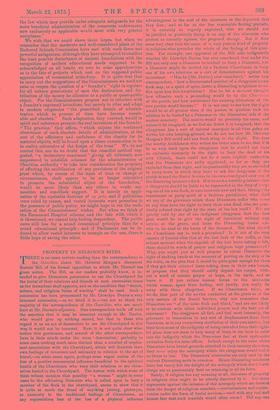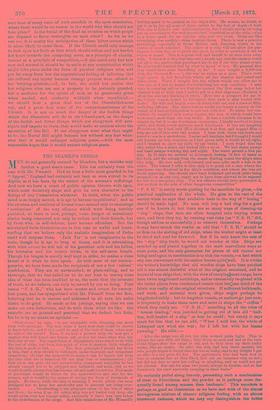PROPERTY IN RELIGIOUS RITES.
THERE is no more curious reading than the correspondence in the Guardian about Mr. Osborne Morgan's dissenters' Burials' Bill, of his formal opposition to which Mr. Disraeli has given notice. The Bill, as our readers probably know, is in- tended to give Dissenters permission to use the Churchyard for the burial of their relations and friends at such convenient times as the incumbent shall approve, and on the condition that "decent, solemn, and religious forms of worship" shall be used. Such a concession has been pronounced by Mr. Llewelyn Davies a very innocent concession,—as we think it is,—but not so think the majority of the correspondents of the Guardian, who are much hurt at Mr. Davies's adjective. One correspondent leads off with the assertion that it may be innocent enough in Mr. Davies, who would give up nothing sacred, but that to those who regard it as an act of desecration to use the Churchyard in this way it would not be innocent. Now, it is not quite clear what notion this gentleman, and several of the other correspondents have in their minds under the term ' desecration,' probably in some cases nothing much more distinct than a number of unplea- sant associations with the Churchyard, which will diminish their own feelings of reverence and solemnity in relation to the act of burial,—in other cases, again, perhaps some vague notion of the loss of a positive sacramental influence beneficial to the spiritual health of the Churchmen who bury their relatives or are them- selves buried in the Churchyard. The horror with which some of these writers mention that possibly " a woman " might in some cases be the officiating Dissenter who is called upon to bury a member of the flock in the churchyard, seems to show that it is quite as much the dread of anything jarring, grotesque, or unseemly to the traditional feelings of Churchmen, as any superstitious fear of the loss of a physical influence 'advantageous to the soul of the mourners or the departed, that they fear ; and so far as the less reasonable feeling prevails, it is certainly so vaguely expressed, that we should not be justified in positively fixing it on any of the alarmists who protest so uneasily against the proposed change. But it does seem very clear that the sense of a very jealous kind of property in religious rites pervades the whole of the feeling of this ques- tion. For example, one opponent of the Bill asks indignantly whether Mr. Llewelyn Davies has ever considered that under the Bill not only may a Dissenter be invited to bury a Dissenter, but a Dissenter might be invited by a factious Churchman to bury one of his own relations, as a sort of demonstration against his incumbent. "Has he [Mr. Davies] ever considered," writes this correspondent, "how a discontented member of a clergyman's own flock may, in a spirit of spite, invite a Dissenting neighbour to in- flict upon him this humiliation ? Has he for a moment thought how offensive such a proceeding would be to the Clo.elvinni of the parish, and how embittered the existing alienation of the two parties would become?" It is not easy to see how the slight would be at all greater than if the person in question took his relation to be buried by a Dissenter in the Dissenters' side of the nearest cemetery. The motive would be precisely the same, and unless it be imagined, as we feel no doubt it is imagined, that the clergyman has a sort of natural monopoly in all rites going on within his own burying-ground, we do not see how Mr. Osborne Morgan's Bill could add any fresh sting to the slight. Nor does the worthy Archdeacon who writes the letter seem to see that if it be so very hard upon the clergyman that he should not have an exclusive monopoly in the right to bury the dead of his own Church, there could not be a more explicit confession that the Dissenters are sadly aggrieved, so far as they are excluded from that right, and unquestionably they are so excluded in every town in which they have to ask the clergyman of the parish to read the Burial Service iu his own churchyard over one of the dissenting minister's flock. If it be such a terrible grievance that a clergyman should be liable to be superseded in the duty of bury- ing one of his own flock, at rare intervals now and then, through the resentment or party spirit of a factious parishioner, what shall we say of the grievance which those Dissenters suffer who never at any time have the right to bury their own dead, who are prac- tically refused that right by the state of the law itself ? We are quietly told by one of the indignant clergymen that the best • plan would be to give the right of interment without any service at the grave, and leave the Dissenting burial ser- . vice to be read in the house of the deceased. But what should we Churchmen say to such a privation P Is it not of the very essence of funeral rites that at the last look of the coffin, at the solemn moment when the anguish of the last leave-taking is felt, there should be words of prayer and religious hope pronounced ? Why, you might just as well propose to refuse Dissenters the right of shaking hands at the moment of parting on the ship or in the train, on the plea that it would be quite good enough for them if they got their outward leave-taking done in their own homes, as propose that they should coldly deposit the corpse, with- out a word of solemn prayer or hope, in the earth, and so leave it. If you reduce human forms to the miuimum which reason, apart from feeling, will justify, you really do away with them altogether. If we Churchmen value, as we do, that part of the service conducted at the grave as of the very essence of the Burial Service, why not remember that Dissenters are "of the same flesh and blood," and are not likely to be content with silent individual prayer and the bare act of interment? The clergymen all feel, and feel most intensely, the grievance to themselves in any sort of displacement from their functions, or in any compulsory mutilation of their own service, but their keen sense of the indignity of being extruded from their right- ful place does not seem to help many of them in the least to enter into the indignity which the Dissenters feel at their systematic extrusion from the same offices. Indeed, except in the cases where Dissenters have burial-grounds attached to their country churches, they never enjoy the monopoly which the clergyman would feel it so bitter to lose. The Dissenters' cemeteries are only used by the various Dissenting sects in common. Hence Dissenting ministers have but rarely felt the delight of the monopoly which the Church clergy are so passionately bent on retaining in all its force.
Surely, if religion has any meaning at all, this sense of property in religious rites ought to be utterly dissolved by it. Are those arguments against the invasion of this monopoly which are derived from the danger of religious scandals,—recriminations and contro- versies under the form of burial services,—used with any real and honest fear that such scandals would often occur? Did any one ever hear of many cases of such scandals in the open cemeteries, where there would be no reason in the world why they should not take place ? Is the burial of the dead an occasion on which people are disposed to fierce onslaughts on each other ? As far as we can see, it is mostly the anticipation of these bitter scenes which is alone likely to cause them. If the Church could only manage to look upon her faith as that which should soften and not harden her heart towards- the competing sects, as a principle of charity, instead as a principle of competition,—if she could only feel how easy and natural it should be to smile at any eccentricities which might take place under the form of peculiar religious rites, and put far away from her the superstitious feeling of believing that she suffered any injury because strange prayers were offered in her burying-grounds,—if, in fact, she could but realise that her religions rites are not a property to be jealously guarded, but a medicine for the spirits of men to be generously given when needed, and modestly withheld when repudiated,— we should hear a great deal less of the Disestablishment cry, and a great deal more of the comprehensiveness of the Church. It is not so mach the danger of the foolish things which the Dissenters will do in the Churchyard, as the danger of the foolish and bitter things which our clergymen will anti- cipate and impute to them, that would make us anxious about the operation of this Bill. If our clergymen were what they ought to be, the Burial Bill might become law without any fear what- ever that it would endanger religious peace,—with the most reasonable hopes that it would cement religious peace.



































 Previous page
Previous page